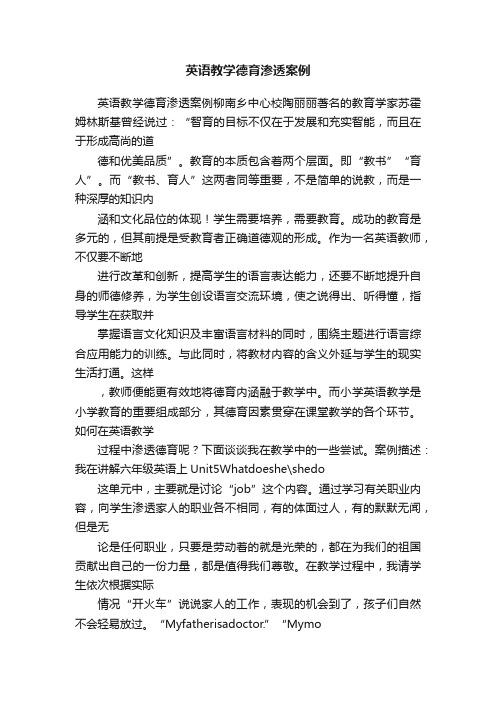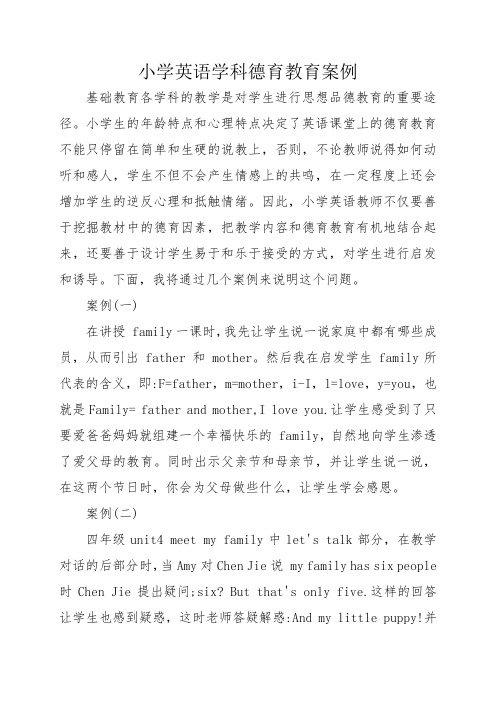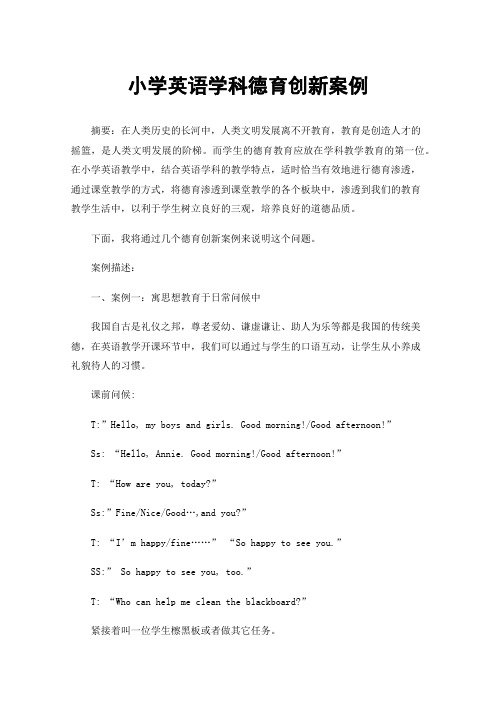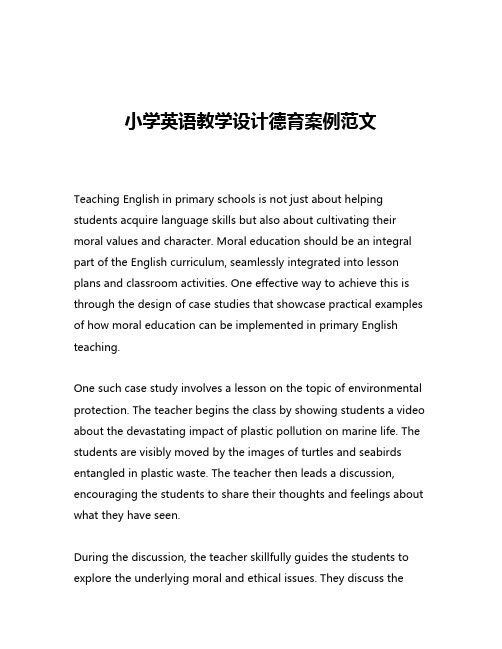关于在小学英语教学中渗透德育知识的案例
小学英语德育案例范文

小学英语德育案例范文I remember when I was in primary school, there was a particular case of moral education that left a lasting impact on me. The school organized a charity event to help raise funds for children in need, and it was a heartwarming experience to see my classmates come together to support this cause. It taught me the importance of empathy and kindness, and how even small acts of generosity can make a difference in someone else's life.我记得当我还在小学的时候,有一起特别触动我的德育案例。
学校组织了一场慈善活动,帮助筹集资金来帮助有需要的孩子,看到我的同学们共同支持这个事业是一次温暖的经历。
这教会了我同情心和善良的重要性,以及即使是小小的慷慨之举也能给别人的生活带来改变。
In addition to the charity event, our school also placed a strong emphasis on values such as honesty, integrity, and respect. We had regular discussions and activities that encouraged us to reflect on these values and incorporate them into our daily lives. It was through these lessons that I learned the importance of integrity and treating others with respect, qualities that I still carry with me today.除了慈善活动,我们学校也非常注重诸如诚实、正直和尊重等价值观。
英语教学德育渗透案例

英语教学德育渗透案例英语教学德育渗透案例柳南乡中心校陶丽丽著名的教育学家苏霍姆林斯基曾经说过:“智育的目标不仅在于发展和充实智能,而且在于形成高尚的道德和优美品质”。
教育的本质包含着两个层面。
即“教书”“育人”。
而“教书、育人”这两者同等重要,不是简单的说教,而是一种深厚的知识内涵和文化品位的体现!学生需要培养,需要教育。
成功的教育是多元的,但其前提是受教育者正确道德观的形成。
作为一名英语教师,不仅要不断地进行改革和创新,提高学生的语言表达能力,还要不断地提升自身的师德修养,为学生创设语言交流环境,使之说得出、听得懂,指导学生在获取并掌握语言文化知识及丰富语言材料的同时,围绕主题进行语言综合应用能力的训练。
与此同时,将教材内容的含义外延与学生的现实生活打通。
这样,教师便能更有效地将德育内涵融于教学中。
而小学英语教学是小学教育的重要组成部分,其德育因素贯穿在课堂教学的各个环节。
如何在英语教学过程中渗透德育呢?下面谈谈我在教学中的一些尝试。
案例描述:我在讲解六年级英语上Unit5Whatdoeshe\shedo这单元中,主要就是讨论“job”这个内容。
通过学习有关职业内容,向学生渗透家人的职业各不相同,有的体面过人,有的默默无闻,但是无论是任何职业,只要是劳动着的就是光荣的,都在为我们的祖国贡献出自己的一份力量,都是值得我们尊敬。
在教学过程中,我请学生依次根据实际情况“开火车”说说家人的工作,表现的机会到了,孩子们自然不会轻易放过。
“Myfatherisadoctor.”“Mymotherisabussiness.”气氛挺活跃的。
当有的学生说到自己的家长职业是bussiness,teacher,doctor等声音非常响亮,但有个别同学在接龙回答时家长职业是worker,farmer时,声音不是很响亮,这时我投影出一幅农名的画像:“头戴草帽,肩搭毛巾,大汗淋漓地在田间劳作”。
同时,我画了一支麦穗sweat,接着我又画了一块糖,并板书单词sweet。
小学英语学科德育教育案例

小学英语学科德育教育案例基础教育各学科的教学是对学生进行思想品德教育的重要途径。
小学生的年龄特点和心理特点决定了英语课堂上的德育教育不能只停留在简单和生硬的说教上,否则,不论教师说得如何动听和感人,学生不但不会产生情感上的共鸣,在一定程度上还会增加学生的逆反心理和抵触情绪。
因此,小学英语教师不仅要善于挖掘教材中的德育因素,把教学内容和德育教育有机地结合起来,还要善于设计学生易于和乐于接受的方式,对学生进行启发和诱导。
下面,我将通过几个案例来说明这个问题。
案例(一)在讲授 family一课时,我先让学生说一说家庭中都有哪些成员,从而引出 father 和 mother。
然后我在启发学生 family所代表的含义,即:F=father,m=mother,i-I,l=love,y=you,也就是Family= father and mother,I love you.让学生感受到了只要爱爸爸妈妈就组建一个幸福快乐的 family,自然地向学生渗透了爱父母的教育。
同时出示父亲节和母亲节,并让学生说一说,在这两个节日时,你会为父母做些什么,让学生学会感恩。
案例(二)四年级unit4 meet my family中let's talk部分,在教学对话的后部分时,当Amy对Chen Jie说 my family has six people 时Chen Jie提出疑问;six? But that's only five.这样的回答让学生也感到疑惑,这时老师答疑解惑:And my little puppy!并解释还有小小狗,介绍西方国家把宠物看作家庭成员的文化特征,普及在西方家庭中他们喜爱宠物把他们当作家庭成员,为宠物买保险,当宠物生病时会送它们去宠物医院积极治疗,虽然在中国我们不能做到与西方国家一样,但是老师在此应积极教育学生应该爱护动物,在中国设立流浪动物之家,保护动物就是保护我们自己,爱护野生动物促进人与动物和谐共处!教师在开展德育渗透英语教学的过程中。
小学英语教学设计德育案例范文

小学英语教学设计德育案例范文English:In teaching primary school English, it is important to incorporate moral education into the curriculum. An example of an effective moral education lesson plan could be teaching students about honesty and integrity through storytelling. The teacher can select a story or fable that emphasizes the importance of being honest and truthful. After reading the story, the teacher can lead a discussion about the characters' choices and their consequences, allowing students to reflect on the moral values conveyed in the story. Following the discussion, the teacher can engage the students in a role-playing activity, where they act out scenarios that require them to make ethical decisions. This helps students understand the real-life applications of honesty and integrity. To reinforce the lesson, the teacher can assign a writing task for the students to reflect on a time when they were faced with a moral dilemma and how they handled it with honesty and integrity. By incorporating moral education into the English curriculum in this way, students not only improve their language skills but also develop important character traits that will benefit them throughout their lives.中文翻译:在小学英语教学中,将德育融入课程是至关重要的。
小学英语学科德育创新案例

小学英语学科德育创新案例摘要:在人类历史的长河中,人类文明发展离不开教育,教育是创造人才的摇篮,是人类文明发展的阶梯。
而学生的德育教育应放在学科教学教育的第一位。
在小学英语教学中,结合英语学科的教学特点,适时恰当有效地进行德育渗透,通过课堂教学的方式,将德育渗透到课堂教学的各个板块中,渗透到我们的教育教学生活中,以利于学生树立良好的三观,培养良好的道德品质。
下面,我将通过几个德育创新案例来说明这个问题。
案例描述:一、案例一:寓思想教育于日常问候中我国自古是礼仪之邦,尊老爱幼、谦虚谦让、助人为乐等都是我国的传统美德,在英语教学开课环节中,我们可以通过与学生的口语互动,让学生从小养成礼貌待人的习惯。
课前问候:T:”Hello, my boys and girls. Good morning!/Good afternoon!”Ss: “Hello, Annie. Good morning!/Good afternoon!”T: “How are you, today?”Ss:”Fine/Nice/Good…,and you?”T: “I’m happy/fine……” “So happy to see you.”SS:” So happy to see you, too.”T: “Who can help me clean the blackboard?”紧接着叫一位学生檫黑板或者做其它任务。
T: “Thank you, so much!”然后第一时间对该位学生表达感谢。
在与学生的问候环节或其教学环节中,经常出现“Thank you”“Excuse me”“Can you…”等礼貌习惯用语,教师可利用这些礼貌用语不失时机地培养学生文明用语的习惯,让学生掌握教材知识的同时,养成良好的道德品质。
作为老师,在课堂中,我们更应该言传身教,课堂用语讲究文明礼貌,在叫学生回答问题或完成任务时常用“Please”,对于学生的帮忙常说“Thank you”。
小学英语德育教学案例

小学英语德育教学案例第一篇:小学英语德育教学案例小学英语德育教学案例案例背景:很长时间以来,小学英语学科一直重视学生对英语听、说、读、写的方面的能力培养,由于课时少、学科内容多等方面的原因英语教师往往忽视了在英语课堂上对学生进行德育教育。
2011年教育部颁布的《英语课程标准》中要求英语教师在教学在应注重提高的综合人文素养,形成跨文化意识,增强学生的爱国主义精神。
学习英语不仅仅是为了满足人际交往的需要,而是要通过英语的学习将各学科的内容进行整合,是学生在学习英语的同时也能接触到其他学科的知识。
帮助学生了解西方的一些文化习俗,体会中西方文化的差异,培养学生的爱国主义精神,增强世界意识,为学生的进一步学习打下坚实的基础。
本案例正是基于《英语课程标准》的要求,在六年级英语“The Great Wall.”这一课中向学生介绍中国的长城等名胜古迹,对他们进行爱国主义教育,培养爱国主义精神。
案例过程:“The Great Wall.”这一课的主要学习目标是运用“There be…”句型介绍某个地方或事物的情况。
学习单词hundred thousand million ,kilometers people之后向学生问“Tell me more about the Great Wall.How long is it? Tell me something about Beijing.How big is it?请学生用汉语谈论关于长城和北京的情况。
我还在课堂上设计了一些联系活动,希望通过这些活动帮助学生掌握本课学习的单词和句型,同时也希望通过这些活动使他们掌握一些课本以外的知识,使学生在丰富多彩的课堂活动中感知语言的应用,受到爱国主义教育。
由于本课是使用“There be…”句型介绍某个地方或事物的情况,于是我准备了一些我国国旗及名胜古迹的图片,请学生谈论这些地方的。
这样既巩固了课堂上所学习的句型,又能拓展学生的知识面,帮助学生了解祖国地大物博,风光秀丽对学生进行爱国主义教育。
小学英语教学设计德育案例范文

小学英语教学设计德育案例范文Teaching English in primary schools is not just about helping students acquire language skills but also about cultivating their moral values and character. Moral education should be an integral part of the English curriculum, seamlessly integrated into lesson plans and classroom activities. One effective way to achieve this is through the design of case studies that showcase practical examples of how moral education can be implemented in primary English teaching.One such case study involves a lesson on the topic of environmental protection. The teacher begins the class by showing students a video about the devastating impact of plastic pollution on marine life. The students are visibly moved by the images of turtles and seabirds entangled in plastic waste. The teacher then leads a discussion, encouraging the students to share their thoughts and feelings about what they have seen.During the discussion, the teacher skillfully guides the students to explore the underlying moral and ethical issues. They discuss theresponsibility we all have as global citizens to protect the environment and the consequences of our actions on the natural world. The teacher highlights the importance of individual and collective action, emphasizing that even small steps like reducing plastic use can make a significant difference.To further reinforce the moral message, the teacher introduces a project where students will design and create reusable shopping bags using recycled materials. The students work in groups, brainstorming ideas and using their creativity to produce unique and environmentally-friendly bags. Throughout the process, the teacher encourages them to consider the environmental impact of their choices and to think critically about the materials they are using.Once the bags are completed, the students organize a school-wide campaign to promote the use of reusable bags. They create posters, write persuasive speeches, and even hold a fashion show to showcase their designs. The enthusiasm and dedication the students demonstrate during this project are truly inspiring, and the teacher takes great pride in witnessing their growth and development.Another case study involves a lesson on the theme of cultural diversity and respect. The teacher begins by sharing a story about a young immigrant student who faces discrimination and bullying at school. The students are visibly upset by the injustice and unfairnessdepicted in the story, and the teacher uses this as an opportunity to engage them in a thoughtful discussion.Through carefully crafted questions and prompts, the teacher encourages the students to reflect on the importance of empathy, compassion, and acceptance. They explore the negative consequences of prejudice and discrimination, and the teacher emphasizes the value of embracing diversity and celebrating our differences.To reinforce these moral lessons, the teacher organizes a cultural exchange program where students from different backgrounds share their traditions, customs, and celebrations with their classmates. The students eagerly participate, bringing in traditional foods, clothing, and artifacts to share with their peers. They also prepare short presentations to educate their classmates about the rich cultural heritage of their families.The cultural exchange program not only fosters a greater understanding and appreciation of diversity but also helps to build a sense of community and belonging within the classroom. The students develop a deeper respect for one another and a stronger commitment to creating an inclusive and welcoming environment.These case studies demonstrate the powerful impact that moraleducation can have within the context of primary English teaching. By seamlessly integrating ethical and values-based lessons into the curriculum, teachers can help students develop not only strong language skills but also a robust moral compass and a deep sense of social responsibility.Moreover, the case studies highlight the importance of creating engaging and interactive learning experiences that capture the students' attention and inspire them to think critically about the world around them. When students are actively involved in the learning process and given the opportunity to apply moral principles to real-world scenarios, they are more likely to internalize and apply these lessons in their daily lives.In conclusion, the integration of moral education into primary English teaching is a crucial aspect of holistic student development. By designing and implementing case studies that address important ethical and social issues, teachers can help their students become not only proficient in the English language but also compassionate, responsible, and engaged global citizens. This approach not only enhances the academic performance of students but also contributes to the creation of a more just, equitable, and sustainable world.。
小学英语渗透德育教学案例

小学英语渗透德育教学案例案例背景:很长时间以来,我们的英语教学一直重视学生听、说水平的培养,我们很容易无视德育在英语课堂的渗透。
学生学习英语不但是为了满足人际交往的需要,也是为了用英语获取各方面的信息,学习其他学科的知识。
教材十分重视在学习内容上与其他学科知识的兼容并蓄,精选学生最需要理解的、最感兴趣的、最有普及价值的、与学生日常生活联系最紧密的学科知识内容、容入到语言材料之中,使学生在学习英语的同时,也能够接触到自然科学、社会文化和文学艺术等方面的基础知识,协助学生理解中西方文化,同时培养学生的爱国主义精神,增强世界意识,为学生的进一步学习奠定良好基础。
本案例正是基于新课改的要求,在三年级英语“It’s Red.”这个课中向学生介绍我们的国旗、国歌,对他们实行爱国主义教育。
培养爱国主义精神。
案例过程:“It’s Red.”这个课的主要目标是学习掌握七个颜色单词:red、yellow、blue、green、orange、purple、pink.在实行完新知识的教授后,学生基本上能够准确地认读这几个单词,并且能反映出单词的中文意思。
然后我设计了一些练习活动,希望通过这些活动协助学生巩固对这几个颜色单词的掌握,同时也希望通过这些活动能让学生理解到一些课本以外的知识,开阔眼界,使学生能够在丰富多彩、生动有趣的课堂活动中感知语言,学习语言,受到美的熏陶和爱国主义教育。
因为这节课学习的是颜色单词,我家里正好有各个国家的国旗图,这些国旗颜色很鲜艳,很丰富。
我想:假如利用这些国旗设计一些活动,既能巩固学到的颜色单词,又能扩展学生的知识面,协助学生理解国旗的知识,对学生实行爱国主义教育。
首先我图片出示各个国家的国旗,先让学生观察每个国旗的图案和颜色,然后提问:what colour is it?然后引导学生用所学单词和举行回答。
当出示中国国旗时,先告诉学生这是我们国家的国旗,我们是中国人,这是中国国旗,再让学生认真观察国旗的颜色和图案,告诉学生:There are five yellow stars in it. It is yellow and red.它的名字叫五星红旗。
- 1、下载文档前请自行甄别文档内容的完整性,平台不提供额外的编辑、内容补充、找答案等附加服务。
- 2、"仅部分预览"的文档,不可在线预览部分如存在完整性等问题,可反馈申请退款(可完整预览的文档不适用该条件!)。
- 3、如文档侵犯您的权益,请联系客服反馈,我们会尽快为您处理(人工客服工作时间:9:00-18:30)。
关于在小学英语教学中渗透德育知识的案例
关于在小学英语教学中渗透德育知识的案例
教育是造就人才的摇篮,是人类文明发展的阶梯.教师将思想素质教育放在教学工作的首位,结合英语学科教学的特点,适时地进行生动有效的德育渗透,通过课堂教学这一渠道,将思想素质教育渗透于课堂教学的各个环节之中,以利于学生树立正确的思想,培养良好的品德.
1、寓思想教育于语言教学之中.
自古以来我国就是一个礼仪之帮,尊老爱幼,助人为乐,是我国的传统美德,在英语教学中,我们可以结合日常口语教学,让学生从小养成礼貌待人的习惯,如教材中,问候语:“goodmorning!howareyou?nicetomeetyou!”英语中的“thankyou!excuseme”经常出现,教师可利用这些礼貌用语不失时机地培养学生文明礼貌的习惯,使学生在掌握英语知识的同时,养成良好的行为习惯.当然作为教师我们更应该“身教重于言教”,课堂用语讲究文明、礼貌,在叫学生回答问题或坐下时常用“please”请学生帮忙时说“excuseme”学生帮了忙,不忘对他说声“thankyou!”叫错了学生名字说声“sorry”等,教师这种彬彬有礼的态度,对学生来说就是最好的教育.同时也可以增加师生之间的感情,对培养学生养成文明、讲礼貌的好习惯起到了潜移默化的作用.
2、寓良好学习、生活和劳动习惯于英语教学之中.
在教学jobs一课时,对于学生瞧不起farmer职业的思想,我是这样引导
的:t:whydon’tyoulikefarmers?s1:theyareverytiredanddirty.t: yes,theyareverytired,becausetheyhavetoworkeveryday.我边说边用简笔画描绘出一幅农民的画像:头戴草帽,肩搭毛巾,大汗淋漓地在田间劳作;同时,我还板书单词
sweat.t:buttheyareveryhappyduringtheharvesttime.我边说边画
出秋天一位农民收获庄稼的情景,并板书单词sweet.然后在单词sweat和sweet前分别添加一个单词,便组成了一句谚
语:nosweat,nosweet.在这个案例中,我对学生的偏差思想没有用“weshouldn’tlookdownuponf armers.theirworkisveryimportant. wecan’tlivewithoutfarmers.”等生硬的话语进行说教,而是巧妙
地利用形象的图画,配以简练和寓意深刻的谚语,向学生渗透了正确
的价值观,在潜移默化中进行了一次成功的德育教育.
3、寓社会美德教育于英语教学之中.
在教学单词kitchen,livingroom,bathroom,bedroom时,我设计了这样的funtime活动.t:doyouknowhim?heismr.forgetful.(课
件呈现一个小男孩)andthisishisbusymorning.(课件呈现这个小
男孩早晨忙乱地收拾学习用品的情景)canyouhelphim?
mr.forgetful:(课件mr.forgetful的声音)whereismybag?s1:(学生仔细观察并帮助mr.forgetful寻找物品)
it’sinthebathroom.mr.forgetful:whereismychinesebook?
s2:it’sinthekitchen.mr.forgetful:whereismy…?在这个案例中,学生通过有趣的活动不仅运用了所学的语言知识,而且帮助了
mr.forgetful.更为重要的是,学生在观察mr.forgetful所犯的错误后,会反思自己的生活习惯,并提醒自己养成良好的生活和学习习惯.通过上述几个案例,我们可以明白这样的道理:课堂中真正有效的德
育教育不是由教师“说”出来的,而是学生在教师巧妙地引导和启发下“悟”出来的.只有这样,学生才能在轻松和愉快的学习氛围中自
然地接受正面的思想教育和受到良好的情感熏陶.
4、寓意志培养于英语教学之中.
在英语教学过程中,教师还要帮助学生树立正确的学习目的,端正自己的学习态度,一丝不苟,顽强刻苦地学习,要鼓励学生勇于同困难作斗争,不能遇到一点困难就退缩,要持之以恒,坚定学好英语的信心,增强克服困难的意志,但进行思想教育并不是简单、枯燥、乏味的说教,而应结合学生实际和教学内容,巧妙地寓思想教育于英语教学中,这样所取得的教育效果远比单一说教的教育方式要理想得多.
如在平时与学生的接触中,了解到学生中普遍有一种怕苦怕累的
情绪,觉得自己一天到晚在学习,一年到头是学习,好象自己是天下最
辛苦的人.考虑到学生的思想实际,上课时有意向学生提
问:“howmanydaysarethereinayear?”学生答:“thereare365day.”又问“howmanydaysdoyougotoschool?”学生一下子回答不上来了.
我趁势引导学生算一笔帐,请他们说出一年中所有的假日,用英文一
一在黑板上列出newyear’sday(1),mayday
(3),nationalday(3),springfestival(3),weekend(2×52=104), summerholiday(50),winterholiday(20),围绕这个列式,进行教学活动,学生不仅学习了英语数字表达法、节日的名称以及用英文加减法等,而且兴趣盎然,思维活跃.接着再问howmanydaysdoyougotoschoolinayear?学生露出了不好意思的神情.
这时教师就感慨地说:howhappyyouare!此时不需多言,学生明白了他
们是天底下最幸福的人,要珍惜光阴,努力学习.
5、寓理想教育于外语教学之中.
理想就是奋斗的目标.要培养学生树立为祖国学好英语的远大理想,当今世界处在信息时代,科学技术迅猛发展.一个民族要想自立于
世界民族之林,除了发展本民族的文化外,还必须吸收其他民族先进
的科学文化,开发本民族的智力.这就要求我们必须掌握外语这门工具.同时,随着我国改革开放的不断深入,与世界各国的交流不断扩大,吸收和借鉴国外先进的技术和管理经验等一切文明成果,学习和掌握
英语就显得格外重要.因此,教师要从长远的观点出发,对学生进行理
想教育.教师可从学生身边的所见所闻,如:广告、商品、文学,以及
大众化的mtv、cctv、…等,对学生进行教育,使学生明白英
语已不是什么陌生的事物,它与我们的生活息息相关,以帮助学生树
立一定要学好英语的远大理想.
总之,德育是教育的一个永恒主题,在英语教学活动中渗透德育是一个需长期坚持的复杂工程.我们教师必须先要自己有德,成为"以德
育人"、"以美传美"的楷模,这样才能把我们的学生培养成德、智、体、美、劳全面发展的综合型人才!。
